RTL Group Bundle
Who Really Owns RTL Group?
Understanding the ownership structure of a media giant like RTL Group is crucial for investors and industry watchers alike. From its humble beginnings in Luxembourg to its current status as a pan-European powerhouse, RTL Group's journey has been shaped by pivotal ownership decisions. Knowing RTL Group SWOT Analysis can provide insights into its strengths and weaknesses.
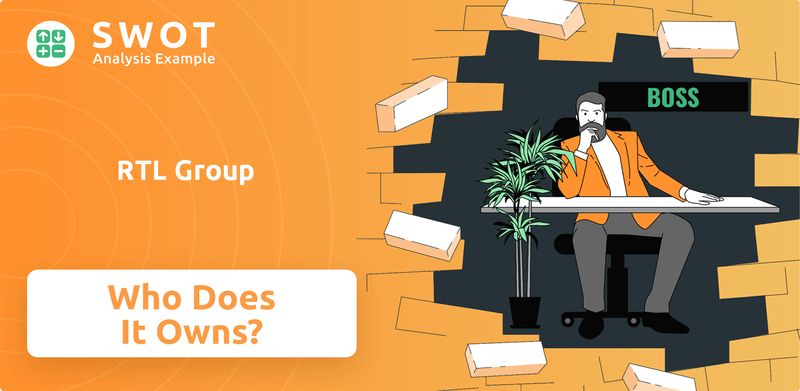
This article unravels the complex tapestry of RTL ownership, exploring the influence of major shareholders and the evolution of its corporate structure. We'll examine the role of key players, including Bertelsmann, and how their decisions have shaped RTL Group's strategic direction and market position. Discover the answers to questions like "Who owns RTL?" and "What company owns RTL Group?" to gain a comprehensive understanding of this leading media company and its subsidiaries.
Who Founded RTL Group?
The ownership structure of RTL Group, a prominent media company, has evolved significantly since its inception. Understanding the historical ownership provides crucial context for analyzing the current corporate landscape and the company's strategic decisions. The roots of RTL Group can be traced back to the early 20th century, with key partnerships shaping its trajectory.
The initial ownership of what would become RTL Group involved entities that merged over time. The earliest predecessor, Compagnie Luxembourgeoise de Radiodiffusion (CLR), laid the foundation in 1931. This was followed by critical partnerships that expanded its reach and influence in the media sector. The evolution of RTL Group's ownership reflects the dynamic nature of the media industry and the strategic alliances that have driven its growth.
The formation of RTL Group involved mergers and acquisitions that consolidated its ownership. The company's history is marked by strategic alliances and mergers that have shaped its ownership structure. These early ownership dynamics are essential for understanding RTL Group's present-day operations and its position in the global media market.
Compagnie Luxembourgeoise de Radiodiffusion (CLR) was established in 1931, marking the initial phase of what would become RTL Group. This entity was the foundational element from which the media conglomerate would later emerge. This early start is crucial for understanding the company's long-term evolution.
In 1984, CLT, the successor to CLR, partnered with Bertelsmann's UFA subsidiary to launch RTL Plus in Germany. At its inception, CLT held 46.1% and Bertelsmann held 38.9% of the share capital in RTL Plus. This collaboration was a pivotal moment, expanding the company's reach into the German market.
Helmut Thoma, the first director of RTL Plus, played a key role in introducing private television in Germany. His leadership, alongside Bertelsmann's then-CEO Mark Wössner, was instrumental in shaping the early success of the channel. Thoma's strategic vision significantly influenced the company's growth.
The merger of CLT and UFA in 1997 created CLT-UFA, consolidating German and international broadcasting services. This merger brought together channels like RTL Television and VOX, as well as M6 in France. This consolidation was a strategic move to strengthen the company's market position.
Bertelsmann gradually increased its stake in RTL during the 1990s, gaining a stronger position. This increased ownership reflected Bertelsmann's commitment to the media company. This strategic investment underscored the long-term potential of the media venture.
The formation of CLT-UFA involved shareholders of UFA (Bertelsmann) and CLT (Audiofina) merging their television, radio, and production businesses. This consolidation of shareholder interests was a key step in the evolution of the company. The strategic alignment of shareholders facilitated the company's expansion.
Understanding the early ownership of RTL Group, including its relationship with Bertelsmann, is crucial for investors and analysts. The evolution of RTL ownership reveals strategic shifts and consolidations that have shaped its current status as a major player in the media industry. For more insights into the company's strategies, consider reading about the Marketing Strategy of RTL Group.
- The initial partnership between CLT and Bertelsmann was a foundational step.
- Helmut Thoma's leadership was instrumental in the early success of RTL.
- The CLT-UFA merger was a significant consolidation event.
- Bertelsmann's increasing stake reflects its long-term commitment.
RTL Group SWOT Analysis
- Complete SWOT Breakdown
- Fully Customizable
- Editable in Excel & Word
- Professional Formatting
- Investor-Ready Format
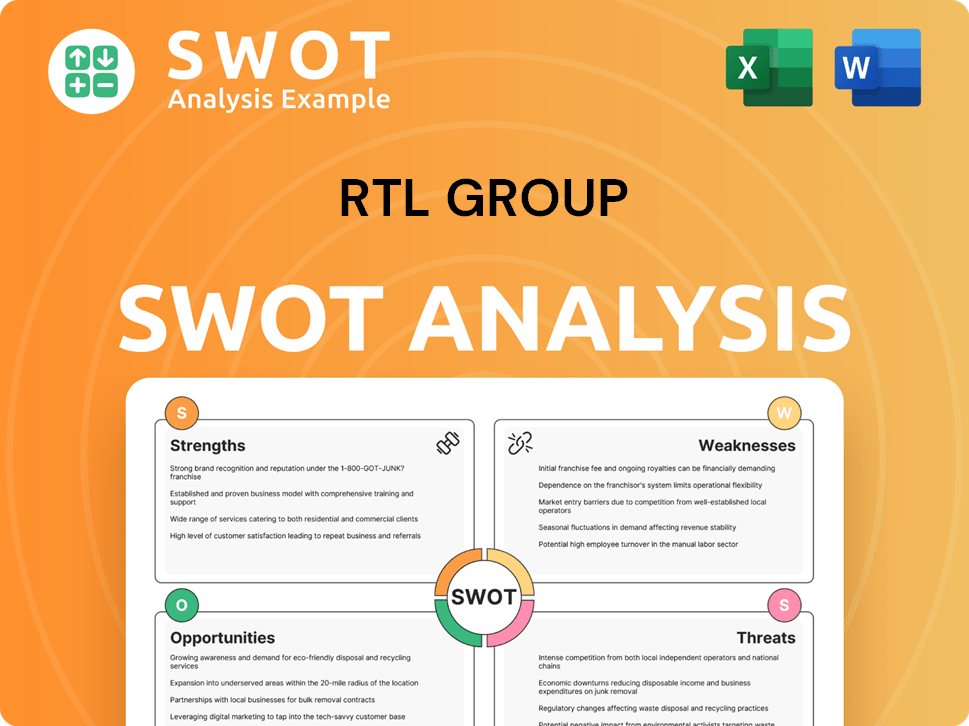
How Has RTL Group’s Ownership Changed Over Time?
The evolution of RTL Group's ownership reflects a strategic consolidation primarily driven by Bertelsmann. Initially listed on the London Stock Exchange in July 2000, the company's formation involved a merger and a complex shareholding structure. Key players at the outset included BWTV, Groupe Bruxelles Lambert (GBL), and Pearson plc, with a portion of shares available to the public. The initial structure set the stage for significant changes in the years to come, particularly regarding Bertelsmann's increasing control.
A pivotal moment occurred in 2001 when Bertelsmann secured majority ownership through a share exchange with GBL. This transaction, which saw GBL receive a stake in Bertelsmann in exchange for its RTL Group shares, propelled Bertelsmann to a dominant position. Subsequently, Bertelsmann steadily increased its stake, solidifying its control over the media giant. This strategic move reshaped the landscape of RTL Group's ownership, setting the stage for its current structure.
| Event | Date | Impact on Ownership |
|---|---|---|
| Initial Public Listing | July 26, 2000 | Established initial shareholder structure, including BWTV, GBL, and Pearson plc. |
| Share Exchange with GBL | 2001 | Bertelsmann became the majority owner with a 67% stake. |
| Ongoing Consolidation | Post-2001 | Bertelsmann increased its stake over time, reaching over 90% at one point. |
As of 2024, Bertelsmann Capital Holding GmbH holds the majority of RTL Group's shares, with a stake of 76.29%. The remaining shares, approximately 23.71%, are publicly traded. The second-largest shareholder is Silchester International Investors, with around 5%. Bertelsmann itself is primarily controlled by the Bertelsmann Foundation and the Mohn family. For 2024, RTL Group's revenue remained stable at €6,254 million. The current structure highlights the long-term influence of Bertelsmann on RTL Group, shaping its strategic direction and operational decisions.
Bertelsmann is the primary owner of RTL Group, with the majority of shares held by Bertelsmann Capital Holding GmbH. The public holds a significant portion of the remaining shares, with Silchester International Investors being the second-largest shareholder. RTL Group's financial performance in 2024 shows stable revenue.
- Bertelsmann's strategic moves have shaped RTL Group's ownership.
- Public trading offers investment opportunities.
- The Mohn family and Bertelsmann Foundation influence Bertelsmann's control.
- Stable revenue in 2024 reflects the company's financial health.
RTL Group PESTLE Analysis
- Covers All 6 PESTLE Categories
- No Research Needed – Save Hours of Work
- Built by Experts, Trusted by Consultants
- Instant Download, Ready to Use
- 100% Editable, Fully Customizable
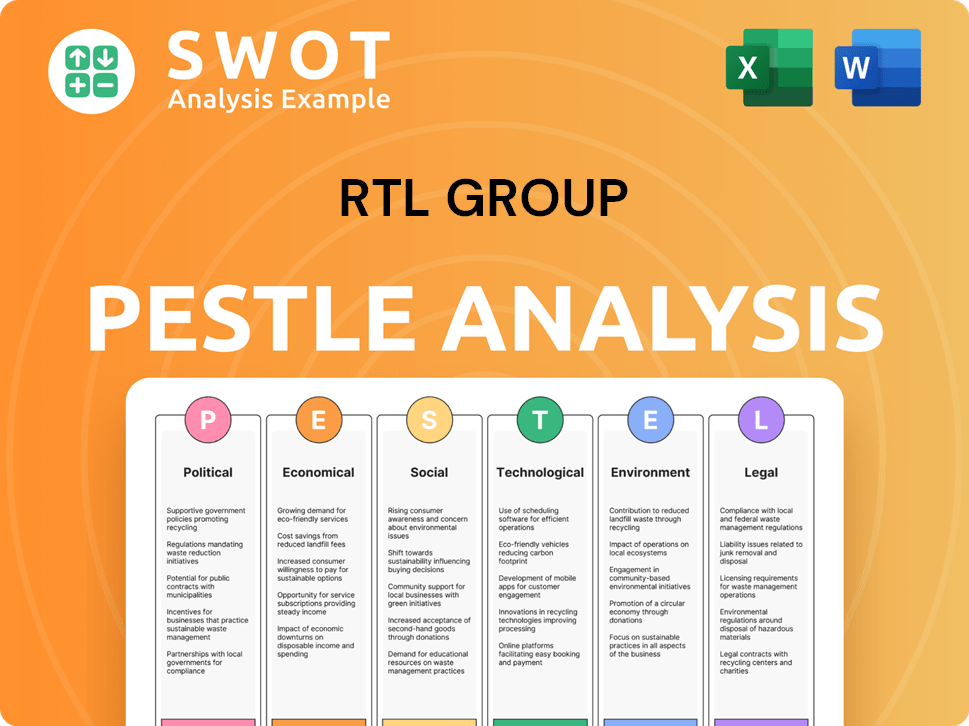
Who Sits on RTL Group’s Board?
The current Board of Directors of RTL Group, operating under Luxembourg law, is pivotal in the company's governance. The board can have a maximum of 14 directors, appointed by the General Meeting of Shareholders for a term not exceeding six years. As of April 2024, the board comprises 13 members, including three executive directors and 10 non-executive directors, with four being independent. The mandates for both executive and non-executive directors were renewed at the Annual Shareholders' meeting on April 24, 2024, primarily for a three-year period.
The structure reflects a commitment to both operational expertise and independent oversight. The presence of both executive and non-executive directors ensures a balance of perspectives in decision-making. The renewal of mandates indicates continuity and stability in leadership. This structure is designed to support effective governance and strategic direction for the media company.
| Director | Role | Notes |
|---|---|---|
| Thomas Rabe | Chief Executive Officer | Also Chairman of the Executive Board of Bertelsmann SE & Co. KGaA |
| Elmar Heggen | Chief Operating Officer and Deputy Chief Executive Officer | |
| Björn Bauer | Chief Financial Officer |
Regarding voting power, all issued and outstanding shares of RTL Group S.A. have equal voting rights, with each share representing one vote. The Articles of Association do not include any voting restrictions, and there are no special control rights attached to any shares. The Board of Directors has broad powers to manage the company's business, encompassing all acts of administration and disposal not reserved for the General Meeting of Shareholders. Decisions are generally made by a simple majority of directors present or represented. This structure ensures that the RTL ownership is straightforward, with each share having equal influence.
RTL Group's governance structure is designed for effective management and shareholder value. The board's composition and voting structure are key to understanding who owns RTL. The relationship between RTL Group and its parent company, Bertelsmann, is crucial. For a deeper dive, explore the Competitors Landscape of RTL Group.
- Board members are appointed for a term not exceeding six years.
- All shares have equal voting rights.
- The Board of Directors holds broad management powers.
- Decisions are made by a simple majority.
RTL Group Business Model Canvas
- Complete 9-Block Business Model Canvas
- Effortlessly Communicate Your Business Strategy
- Investor-Ready BMC Format
- 100% Editable and Customizable
- Clear and Structured Layout
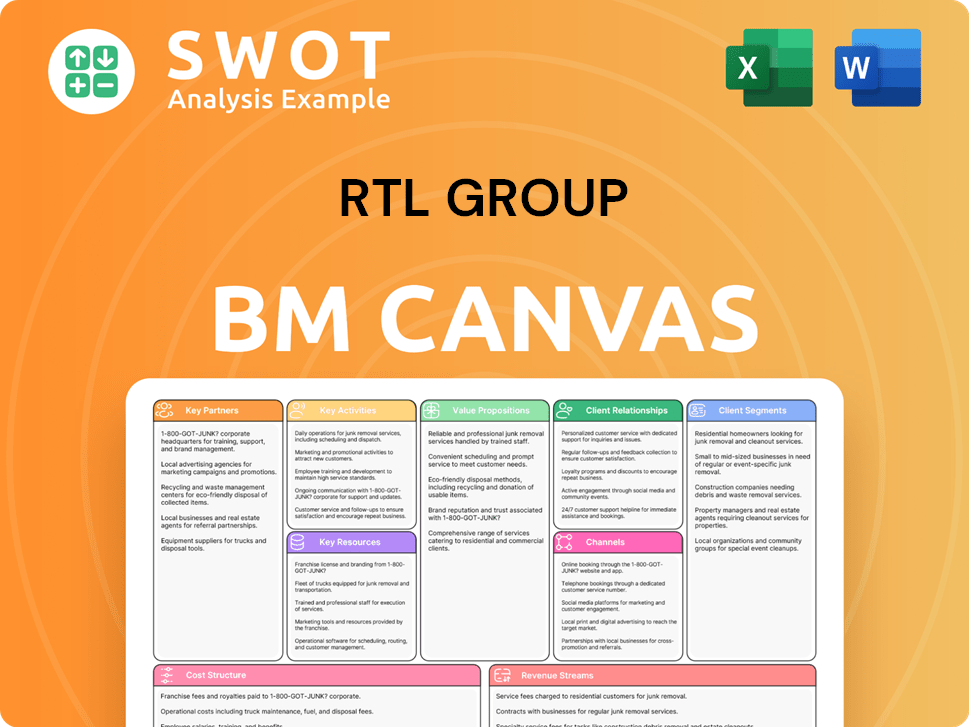
What Recent Changes Have Shaped RTL Group’s Ownership Landscape?
In the past few years, the ownership of RTL Group has remained relatively stable, with Bertelsmann maintaining a controlling stake. As of 2024, Bertelsmann's ownership stands at approximately 76%, solidifying its position as the primary shareholder. This stability is a key characteristic of the media company's ownership, reflecting a consistent strategic direction.
A significant trend in RTL Group's recent performance is its focus on streaming services. RTL Group's streaming revenue increased by 42% to €403 million in 2024, driven by a rise in paying subscribers and higher subscription prices, particularly for RTL+ in Germany and M6+ in France. The company is on track to achieve profitability in its streaming segment by 2026, demonstrating its commitment to digital media. The number of paying streaming subscribers across Germany, Hungary, and France grew by 21% to 6.8 million in 2024.
| Metric | 2024 | Change |
|---|---|---|
| Streaming Revenue | €403 million | +42% |
| Paying Streaming Subscribers | 6.8 million | +21% |
| Fremantle Revenue | €2,254 million | Stable |
| RTL Group Profit | €555 million | N/A |
While Bertelsmann reduced its shareholding through a public offering in 2013, the core ownership structure has remained consistent. Other significant shareholders include institutional investors like Silchester International Investors. RTL Group continues to form strategic alliances within the European media industry, such as the advertising sales partnership with Ad Alliance in Germany. For more insights into the company's strategic positioning, consider reading about the Target Market of RTL Group.
Bertelsmann holds approximately 76% of RTL Group's shares as of 2024, maintaining significant control. This majority ownership underscores a long-term commitment to the media company. The consistent ownership structure reflects a stable strategic direction for RTL Group.
RTL Group's streaming revenue surged by 42% in 2024, reaching €403 million. This growth is fueled by increased subscribers and higher subscription prices. The company is targeting profitability in its streaming segment by 2026.
Fremantle's revenue remained stable at €2,254 million in 2024, despite the challenges in the content production market. The acquisition of Asacha Media Group in March 2024 supported this performance. RTL Group aims to increase Fremantle's Adjusted EBITA margin to 9% by 2026.
RTL Group emphasizes alliances within the European media industry, such as the advertising sales partnership with Ad Alliance in Germany. These collaborations are key to expanding market reach. The company's total Group profit for 2024 was €555 million.
RTL Group Porter's Five Forces Analysis
- Covers All 5 Competitive Forces in Detail
- Structured for Consultants, Students, and Founders
- 100% Editable in Microsoft Word & Excel
- Instant Digital Download – Use Immediately
- Compatible with Mac & PC – Fully Unlocked
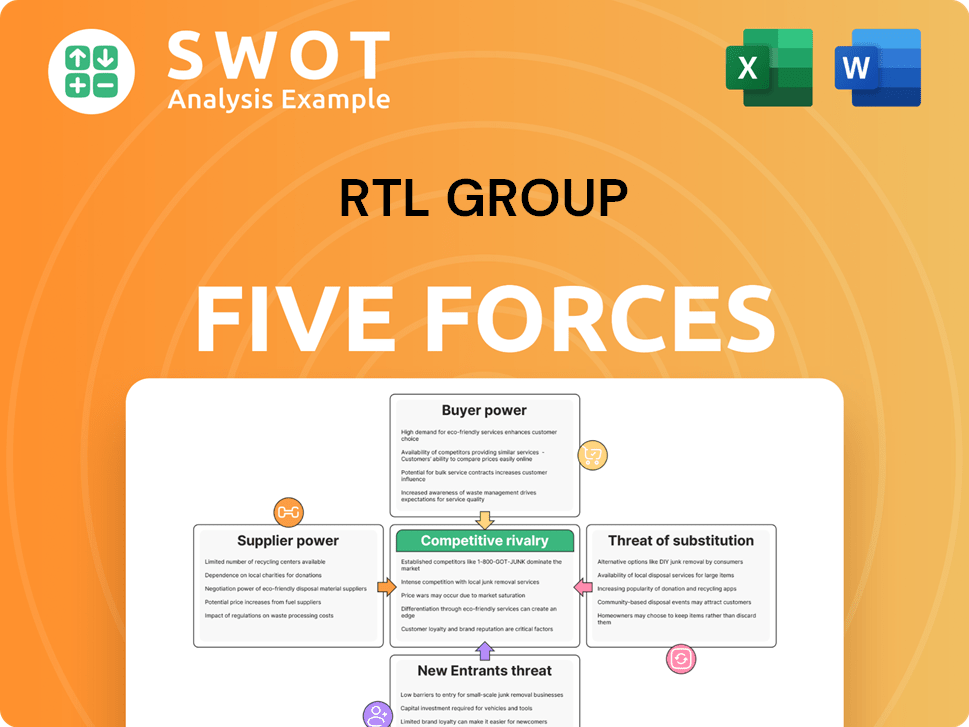
Related Blogs
- What are Mission Vision & Core Values of RTL Group Company?
- What is Competitive Landscape of RTL Group Company?
- What is Growth Strategy and Future Prospects of RTL Group Company?
- How Does RTL Group Company Work?
- What is Sales and Marketing Strategy of RTL Group Company?
- What is Brief History of RTL Group Company?
- What is Customer Demographics and Target Market of RTL Group Company?
Disclaimer
All information, articles, and product details provided on this website are for general informational and educational purposes only. We do not claim any ownership over, nor do we intend to infringe upon, any trademarks, copyrights, logos, brand names, or other intellectual property mentioned or depicted on this site. Such intellectual property remains the property of its respective owners, and any references here are made solely for identification or informational purposes, without implying any affiliation, endorsement, or partnership.
We make no representations or warranties, express or implied, regarding the accuracy, completeness, or suitability of any content or products presented. Nothing on this website should be construed as legal, tax, investment, financial, medical, or other professional advice. In addition, no part of this site—including articles or product references—constitutes a solicitation, recommendation, endorsement, advertisement, or offer to buy or sell any securities, franchises, or other financial instruments, particularly in jurisdictions where such activity would be unlawful.
All content is of a general nature and may not address the specific circumstances of any individual or entity. It is not a substitute for professional advice or services. Any actions you take based on the information provided here are strictly at your own risk. You accept full responsibility for any decisions or outcomes arising from your use of this website and agree to release us from any liability in connection with your use of, or reliance upon, the content or products found herein.